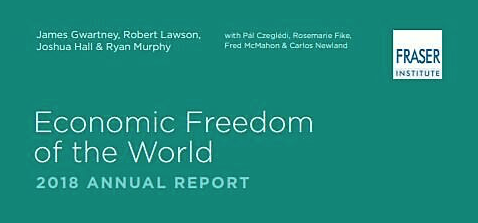September 18, 2021
Nassau, Bahamas—The Bahamas ranks 52 out of 165 countries and territories included in the Economic Freedom of the World: 2021 Annual Report, released today by The Nassau Institute in conjunction with Canada’s Fraser Institute.
Last year, The Bahamas ranked 39 falling 13 notches and replaced by Jamaica which now ranks 39.
Hong Kong and Singapore again top the index, continuing their streak as 1st and 2nd respectively. New Zealand, Switzerland, Georgia, the United States, Ireland, Lithuania, Australia and Denmark round out the top 10.
The report, based on 2019 data (the most recent comparable data), warns that recent events in Hong Kong will likely cause its score to fall as data become available for 2020 and 2021.
“Beijing’s intrusion on the rule of law, the foundation of economic freedom, will negatively affect economic freedom in Hong Kong,” said Fred McMahon, Dr. Michael A. Walker Research Chair in Economic Freedom with the Fraser Institute. “For the sake of the people of Hong Kong, we’ll continue to monitor the situation and report any decline in freedom.”
The report was prepared by James Gwartney, Florida State University; Robert Lawson and Ryan Murphy of Southern Methodist University; and Joshua Hall, West Virginia University. It measures the economic freedom (levels of personal choice, ability to enter markets, security of privately owned property, rule of law, etc.) by analysing the policies and institutions of 165 countries and territories.
The 10 lowest-rated countries are Central African Republic, Democratic Republic of Congo, Syria, Republic of Congo, Iran, Zimbabwe, Algeria, Libya, Sudan and Venezuela. (Despotic countries such as North Korea and Cuba can’t be ranked due to lack of data.)
Other notable rankings include Japan (18th), Germany (22nd), Italy (47th), France (53rd), Mexico (75th), Russia (100th), India (108th), Brazil (109th) and China (116th).
According to research in top peer-reviewed academic journals, people living in countries with high levels of economic freedom enjoy greater prosperity, more political and civil liberties, and longer lives.
For example, countries in the top quartile of economic freedom had an average per-capita GDP of US$50,619 in 2019, compared to US$5,911 for bottom quartile countries. And poverty rates are lower. In the top quartile, 0.9 per cent of the population experienced extreme poverty (US$1.90 a day) compared to 34.1 per cent in the lowest quartile.
Finally, life expectancy is 81.1 years in the top quartile of countries compared to 65.9 years in the bottom quartile.
“Where people are free to pursue their own opportunities and make their own choices, they lead more prosperous, happier and healthier lives,” McMahon said.
The Fraser Institute produces the annual Economic Freedom of the World report in cooperation with the Economic Freedom Network, a group of independent research and educational institutes in nearly 100 countries and territories. It’s the world’s premier measurement of economic freedom, measuring and ranking countries in five areas—size of government, legal structure and security of property rights, access to sound money, freedom to trade internationally and regulation of credit, labour and business.
 See the full report at www.fraserinstitute.org/economic-freedom.
See the full report at www.fraserinstitute.org/economic-freedom.
The Bahamas scores in key components of economic freedom (from 1 to 10 where a higher value indicates a higher level of economic freedom):
- Size of government: changed to 8.77 from 9.1 in the last year’s report
- Legal system and property rights: changed to 6.32 from 6.17
- Access to sound money: changed to 7.77 from 8.11
- Freedom to trade internationally: changed to 6.26 from 6.25
- Regulation of credit, labour and business: changed to 8.69 from 8.46
About the Economic Freedom Index
Economic Freedom of the World measures how policies and institutions of countries support economic freedom. This year’s publication ranks 165 countries and territories. The report also updates data in earlier reports where data has been revised.
For more information on the Economic Freedom Network, datasets and previous Economic Freedom of the World reports, visit www.fraserinstitute.org. And you can “Like” the Economic Freedom Network on Facebook at www.facebook.com/EconomicFreedomNetwork.
-30-
CONTACTS:
Rick Lowe (242) 302-0140
rick @ nassauinstitute.org
For more information on the Economic Freedom Network, datasets, and previous Economic Freedom of the World reports, go to www.fraserinstitute.org/economic-freedom.
The Nassau Institute is an independent, a-political, non-profit institute that promotes economic growth in a free market economy with limited government, in a society that embraces the rule of law and the right to private property. www.nassauinstitute.org



